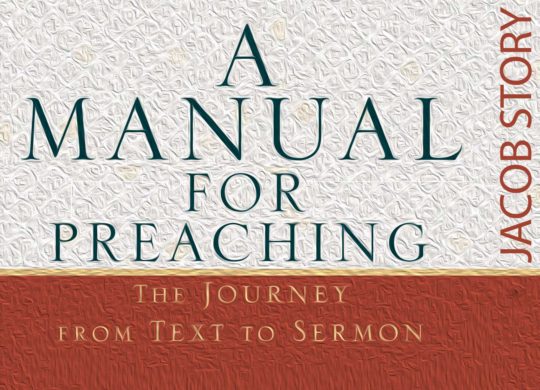Genesis 32:1–32

Jacob’s encounter with the angels of God and the “camp of God” (Gen 32:1–2) reminds him of the continued presence of God and the protection of God, as he moves closer to a rendezvous with Esau, who, when we last heard of him, had been harboring homicidal inclinations towards his heel-grabbing younger brother (27:41). There is a hint that this “camp of God” may have been the armies of heaven; the only other instance of “camp of God” in the OT is a military reference (1 Chr 12:22)—all the more reason for Jacob to have felt confident.
God’s strengthening presence.
The rest of the first episode of this chapter describes the efforts of Jacob at mollification. He is desperately seeking Esau’s “grace/favor” (Gen 32:5), “greatly afraid and distressed” (32:7), despite God’s promises (31:3) and a magnificent theophany (32:1–2).
But flattery with the promise of cattle did not seem to have accomplished much with Esau (32:3–6). So, fearing that Esau has not been appeased, Jacob tries God next (32:9–12). This is the first time in the Jacob Story that he turns to God for help, the first time he calls himself God’s servant. In fact, this is the first time in the narrative that Jacob is said to have prayed, prompted, no doubt, by the seriousness of the current crisis.
Earlier Jacob called Esau his “lord,” and himself Esau’s “servant” (32:4, 5). In contrast, when Jacob prays to God, Esau is simply his “brother” (32:11), perhaps pointing to a manipulative approach with regard to his sibling. Instead, in his prayer he labels himself a “servant” of God; only to become a “servant” of Esau again later (32:18, 20). Jacob is willing to be the “servant” of whoever will keep him from harm, whether it be God or Esau. Jacob seems willing to manipulate both.
Following his prayer, Jacob engages in some frenetic activity, sending 550 animals to Esau (32:13–21). Jacob calls his gift a “present” (32:13, 18, 20; the Hebrew word also means “sacrifice,” as in Lev 2:1, 4, 5, 6, 15), to “appease” (also means “atonement,” as in Lev 1:4; 4:20, 26, 31, 35; etc.), so that Esau would “accept” him (Gen 33:10; also in cultic contexts: Lev 1:4; 7:18; 19:7; 22:23, 25, 27; etc.). Jacob seems to be attempting a propitiation, seeing Esau almost as deity. He is confused: “Who will save me? God? Esau?”
All of Jacob’s feverish activities are literarily depicted as futile, for the entire event is shrouded in darkness: the transactions begin and end at “night” (Gen 32:13, 21)
God’s strengthening presence, but one’s fear and attempts to manipulate others (and God)—signs of persisting darkness.
Jacob, now at his wits’ end, gets into a wrestling match with deity (32:30). Recognizing who it was he was tangling with, Jacob asks to be blessed, refusing to let go until he gets the blessing (32:26). All these many decades, he had been trying to secure one blessing or another by his own wheeling and dealing, by heel-grabbing and back-stabbing, by manipulating, conniving, cheating, and deceiving. Finally, here, he realizes that the true source of blessing is God alone.
God’s strengthening presence, but Jacob’s fear and attempts to manipulate Esau—signs of persisting darkness. Jacob’s recognition of the true source of blessing.
God responds to Jacob’s request with a name-change, from “Jacob” to “Israel” (32:27–28)—“God fights,” that is, “God fights for you (so you don’t need to fight for yourself).” And then the man who has been chasing blessing all his life is blessed (32:29)! And overpowered by his divine wrestling partner, Jacob would limp for the rest of his life, a silent testimony to his lack of self-sufficiency and to the absolute sufficiency of Yahweh who would fight for him.
What began at night (32:24) now ends at dawn (32:31). The sun did not just rise, but it “rose upon him” (32:31).
God’s strengthening presence, but one’s fear and attempts to manipulate others (and God)—signs of persisting darkness. Contrasted with one’s recognition of the true source of blessing, and God’s promise to fight for one—signs of a new dawn.
To keep it short and in a single sentence:
Remembering that God fights for him/her, the child of God lives life with confidence and fearlessness.











 Abe Kuruvilla is the Carl E. Bates Professor of Christian Preaching at The Southern Baptist Theological Seminary (Louisville, KY), and a dermatologist in private practice. His passion is to explore, explain, and exemplify preaching.
Abe Kuruvilla is the Carl E. Bates Professor of Christian Preaching at The Southern Baptist Theological Seminary (Louisville, KY), and a dermatologist in private practice. His passion is to explore, explain, and exemplify preaching.